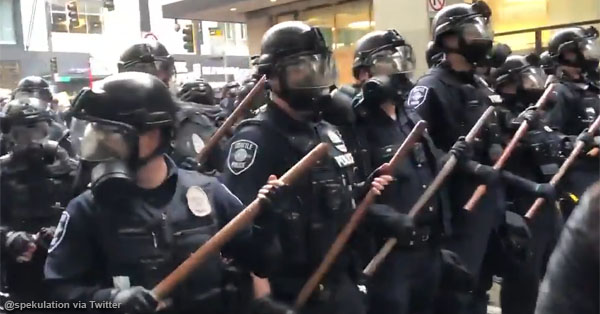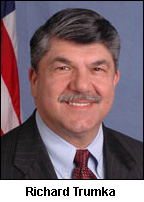NATIONAL
With labor’s support, House passes sweeping police reform
WASHINGTON, D.C. (June 26, 2020) — With strong support from organized labor, the U.S. House of Representatives passed sweeping police reform legislation Thursday night that aims to curb the use of excessive force and begin demilitarizing law enforcement one month after the death George Floyd, an unarmed Black man who was killed by Minneapolis police officers.
The vote on passage of the George Floyd Justice in Policing Act (H.R. 7120) was 236-181. Washington’s Democratic congressional delegation — Reps. Suzan DelBene, Rick Larsen, Derek Kilmer, Pramila Jayapal, Kim Schrier, Adam Smith and Denny Heck — all voted “yes,” while Republican Reps. Jaime Herrera Beutler, Dan Newhouse and Cathy McMorris Rodgers voted “no.”

“The Justice in Policing Act is a bold step to enact comprehensive reforms to curb police brutality and end racial profiling,” said Rep. Adam Smith (D-WA, 9th) “It provides accountability and transparency to fundamentally change the culture of law enforcement. While this bill is an essential step, our work is far from finished. This is but one step in the much larger process of ensuring justice and equality for all. I will continue to work towards the dramatic changes required in all aspects of our society to end systemic racism and excessive police force in our country.”
 Larry Brown, President of the Washington State Labor Council, AFL-CIO, wrote each member of Washington’s congressional delegation to urge their support for the legislation.
Larry Brown, President of the Washington State Labor Council, AFL-CIO, wrote each member of Washington’s congressional delegation to urge their support for the legislation.
“This legislation will solve some very old problems in our country and reduce the conflict between our nation’s law enforcement and communities of color,” Brown wrote.
If enacted into law, the Justice in Policing Act will:
● Work towards ending racial and religious profiling by police providing training requirements to help law enforcement identify and eliminating the practice
● Saves lives by banning chokeholds and no-knock warrants by conditioning federal funding on compliance
● Requires a de-escalate first and use-of-force as a last-resort standard
● Limits use of surplus military equipment by police and requires use of body cameras
● Amends the federal standard of “willful” to “reckless” and makes it easier for individual to recover damages in civil court when law enforcement violates their constitutional rights
● Provides for a pathway to investigate police departments by the U.S. Justice Department Civil Rights Division
● Creates federal grants to build new and innovative community based groups for reimagining policing strategies
● Improves transparency by collecting data on police misconduct and use-of-force
● And FINALLY, makes lynching a federal crime
 “The scourge of violence against Black people in America has reached a tipping point, and it is critical that Congress take comprehensive action to redesign policing and address longstanding structural racism,” said AFL-CIO President Richard Trumka. “Union members live and work in every state and in every community, so when police abuse occurs, it happens in our backyards and to our families. We also represent tens of thousands of law enforcement officers who go to work every day and risk their lives to protect the public. As such, we have a special responsibility to play a leading role in making sure that real reform is achieved.”
“The scourge of violence against Black people in America has reached a tipping point, and it is critical that Congress take comprehensive action to redesign policing and address longstanding structural racism,” said AFL-CIO President Richard Trumka. “Union members live and work in every state and in every community, so when police abuse occurs, it happens in our backyards and to our families. We also represent tens of thousands of law enforcement officers who go to work every day and risk their lives to protect the public. As such, we have a special responsibility to play a leading role in making sure that real reform is achieved.”
He added, “While not perfect, the Justice in Policing Act includes concrete, commonsense actions like banning chokeholds, expanding the use of body cameras, ending racial profiling and demilitarizing police departments. Today, the House took an important step forward in creating a fairer, more community-centric policing culture. We urge the Senate to follow suit.”
However, the Republican-controlled Senate is not expected to take up the bill. Majority Leader Mitch McConnell prefers his party’s more limited legislation that offers police departments extra funding and incentives if they voluntarily enact reforms rather than mandating the changes with federal bans. McConnell was unable to muster sufficient support to pass that legislation from the GOP-controlled Senate earlier this week.





